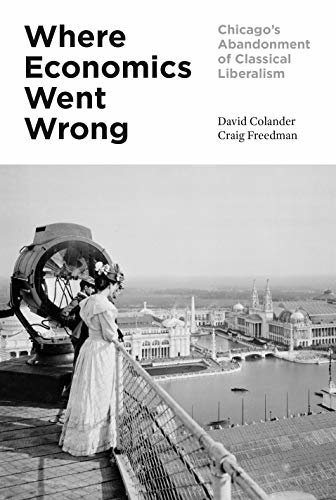
Where Economics Went Wrong: Chicago's Abandonment of Classical Liberalism (English Edition)
- 作者
- David Colander、Craig Freedman
- 语言
- 英语
- 出版社
- Princeton University Press
- 出版日期
- 2018年11月27日
- 纸书页数
- 288页
- 电子书格式
- epub,pdf,mobi,azw3,txt,fb2,djvu
- 文件大小
- 1414 KB
- 下载次数
- 2019
- 更新日期
- 2023-05-14
- 运行环境
- PC/Windows/Linux/Mac/IOS/iPhone/iPad/iBooks/Kindle/Android/安卓/平板
内容简介
How modern economics abandoned classical liberalism and lost its wayMilton Friedman once predicted that advances in scientific economics would resolve debates about whether raising the minimum wage is good policy. Decades later, Friedman’s prediction has not come true. In Where Economics Went Wrong, David Colander and Craig Freedman argue that it never will. Why? Because economic policy, when done correctly, is an art and a craft. It is not, and cannot be, a science. The authors explain why classical liberal economists understood this essential difference, why modern economists abandoned it, and why now is the time for the profession to return to its classical liberal roots.Carefully distinguishing policy from science and theory, classical liberal economists emphasized values and context, treating economic policy analysis as a moral science where a dialogue of sensibilities and judgments allowed for the same scientific basis to arrive at a variety of policy recommendations. Using the University of Chicago—one of the last bastions of classical liberal economics—as a case study, Colander and Freedman examine how both the MIT and Chicago variants of modern economics eschewed classical liberalism in their attempt to make economic policy analysis a science. By examining the way in which the discipline managed to lose its bearings, the authors delve into such issues as the development of welfare economics in relation to economic science, alternative voices within the Chicago School, and exactly how Friedman got it wrong.Contending that the division between science and prescription needs to be restored, Where Economics Went Wrong makes the case for a more nuanced and self-aware policy analysis by economists.
Where Economics Went Wrong: Chicago's Abandonment of Classical Liberalism (English Edition) EPUB, PDF, MOBI, AZW3, TXT, FB2, DjVu, Kindle电子书免费下载。
- 爱上咖啡 林莹、毛永年
- Cervantes's Novel of Modern Times: A New Reading of Don Quijote (English Edition) David Quint
- 职场色商(10分钟色商自我评估,让你找准自己的性格类型与职业方向) 索亚·泽奇、安·毕度
- Making the Modern Reader: Cultural Mediation in Early Modern Literary Anthologies (Princeton Legacy Library) (English Edition) Barbara M. Benedict
- 平台:自媒体时代用影响力赢取惊人财富(美国自媒体教父告诉你怎样玩转微信、微博、公众号、推特而日进斗金、名利双收) 迈克尔·哈耶特
- 八分之七的冰山:海明威传(纪念海明威诞辰120周年) 弗娜·卡莱、周琳琳
- 婴幼儿养育大百科(科学育儿全程专家指导) 王玉萍
- 爱的教育(著名夏丏尊先生流芳90年经典译本,享誉世界的儿童文学读物) 亚米契斯、夏丏尊
- Studies in Public Opinion: Attitudes, Nonattitudes, Measurement Error, and Change (English Edition) Willem E. Saris、Paul M. Sniderman
- 领导智慧三千言 晓山
- 祖言:中国戏曲谚语说要(酒香也怕巷子深——戏曲艺术的昨日今天) 刘克定
- 图解小儿按摩祛百病 (芝宝贝) 崔绍珍、宋艳
- 小城畸人(舍伍德·安德森的不朽之作;位列“二十世纪百佳英语小说”第二十四名;深刻影响海明威、福克纳等多位重量级作家) 舍伍德·安德森、刘士聪
- Hadrian and the Cities of the Roman Empire (English Edition) Mary T. Boatwright
- 长胎不长肉(孕期营养学的革命性突破,带你发现明星孕妈长胎不长肉的秘密) 王兴国、滕越
- 中国地方环境政治:政策与执行之间的距离 冉冉
- 糟糠之妻(中国版《绝望的主妇》,撼动心灵的婚变人生) 未夕
- A House Divided: The Antebellum Slavery Debates in America, 1776-1865 (English Edition) Mason I. Lowance
- 鲍德里亚媒介文化理论的生存论阐释 王咏梅
- 嘉定忠臣:17世纪中国士大夫之统治与社会变迁 邓尔麟、宋华丽
- How to Be Free: An Ancient Guide to the Stoic Life (Ancient Wisdom for Modern Readers) (English Edition) Epictetus、Anthony Long
- 优等生最爱读的中华古训(提高阅读兴趣,丰富写作素材;阅读,让写作变得简单) 王少毅
- 十月的风——弗拉基米尔·伊里奇·列宁:事件与回忆(由俄罗斯联邦共产党独家授权,全球唯一中文版本;五百九十幅国外档案馆、博物馆里珍贵历史图片,纪念伟大的十月社会主义革命一百周年)(列宁诞辰150周年) 俄罗斯联邦共产党中央委员会、中共中央编译局马列著作编译部
- 透析童年:探寻成人和孩子生命内在的连结 王树
- 体罚与人性 乔治·莱利·斯科特、秦传安
- How to Be a Leader: An Ancient Guide to Wise Leadership (Ancient Wisdom for Modern Readers) (English Edition) Plutarch、Jeffrey Beneker
- 之宝贝书系90:婴幼儿护理必备大百科 戴耀华
- 哈达瑜伽精义 (印)斯瓦米韦达、石宏
- 从食神到女神:气血好的女人不会老(女人气血通, 脾胃和,面色润,身体棒!专家教你养好气血人不老!) 杨国军
- 带着孩子,跟着宋词去旅行 任乐乐